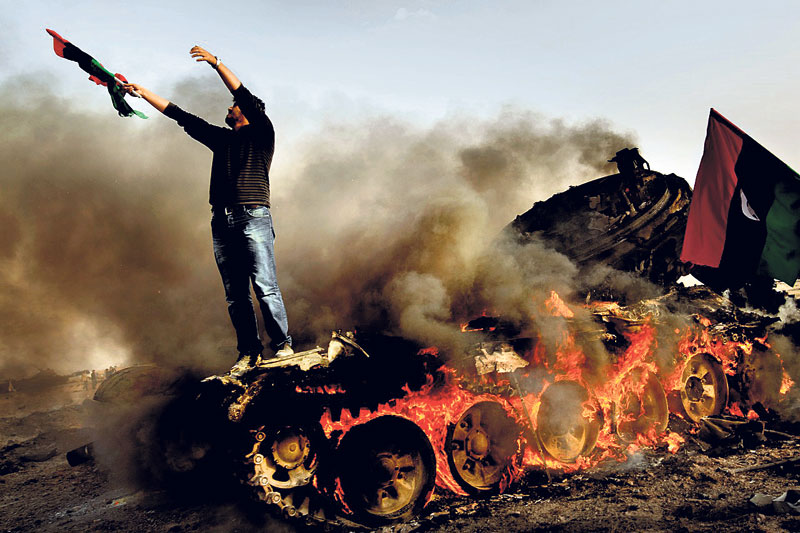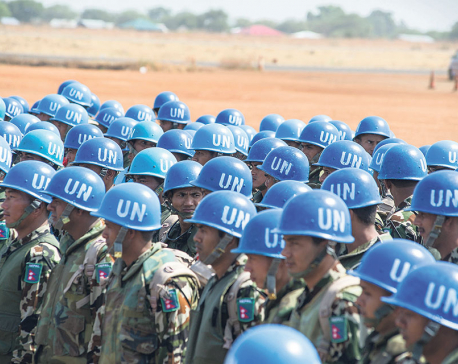
OR

February 2017 marks eight years of the beginning of the Arab Spring protest of 2011 in Libya, which led to the ousting and ultimate death of Muammar Gaddafi (the deposed leader of Libya). My project team and I were on one of the last commercial flights leaving Libya at that time and though now it is a good story to tell, it could have gone horribly wrong.
I was working for a Bangalore-based engineering firm and was assigned as ‘Country Manager–Libya Operations’ for the prestigious ‘Water Project’, a part of Col. Gaddafi’s ambitious ‘Great man made River Project’. By the time the Arab spring protest started in early 2011, we had established a Joint Stock Company in Libya and I, as the Executive Director, had been running it for over two years.
Arab Spring protest
The Arab Spring protest was a revolutionary wave that commenced with the Tunisian revolution sparked by self-immolation of a street vendor, Mohamed Bouazizi, on 17 December 2010. This was followed by the January 25 revolution in Egypt.
The demonstrations were precipitated by high unemployment, food inflation, corruption, lack of political freedom and poor living conditions. However, Libya had a thriving economy and was a stable state compared to Tunisia and Egypt and moreover, Col. Gaddafi was seemingly a more powerful leader compared to his counterparts. When murmurs of revolution started to surface in Benghazi in Eastern Libya (adjacent to Egyptian border) in February 2011, these were dismissed as trivial.
As the uprising in Benghazi and the East took wings, the city of Tripoli, about a thousand km away, where the government was located, was relatively quiet. However, the Indian embassy summoned heads of all Indian companies in Libya and warned us of a more serious revolution.
By 20th of February, the situation was becoming ominous in Tripoli. The American and European embassies were already asking their staff to leave. Shortly thereafter, the revolution spread to Tripoli and several government buildings were attacked. I hurriedly visited the Indian embassy and the advice was that companies should start evacuating their staff by commercial flights at their expense. Evacuation by Indian government (which is free) was being discussed but was not certain.
I sent request to my head office in Bangalore seeking permission to evacuate. But I had another and an equally serious quandary! Although I was head of an Indian company, I was a Nepalis citizen. Indian government would not evacuate Nepalis, unless they had an agreement with Nepal. I explained my quandary to my company, but their indifferent advice was that as a good captain I should be the last one to leave the ship!
Tripoli was a war-zone by now. My company had still not approved our evacuation. Most of my staffs were desperate and willing to ask their families to arrange for their tickets.
Finally, I had to issue an ultimatum to my company; I was going ahead with the evacuation—either company provides our tickets or we will arrange ourselves. The company finally approved and started arranging the tickets. Families and ladies first, followed by other able-bodied staff with captain of the ship (yours truly) to leave last.
Lucky escape
Days were spent receiving the tickets on Skype (there was internet outage but Skype was working) and escorting staff to the airport. Some were returned as commercial airlines were evacuating their citizens by then and refusing other nationalities.
Finally, it was the day for me to leave with the last of our staffs. The escort van driven by our driver Mohammad Gaddafi (it was common to name children after the leader) arrived and took us to the office, where we bid farewell to the loyal staff (some had offered to give me shelter in their house (‘They will have to walk over my dead body before they reach you Sir!’).
The international airport was thought to be a safe haven and was swarming with migrants, most of them who did not have tickets. There was a crowd of people obstructing the way to the terminal and we couldn’t make our way in. Our liaison officer left us to make arrangements for our entry, instructing us not to move. Soon thereafter, Gaddafi loyalists emerged in army trucks, chanting ‘Allah first, Gaddafi second and then Libya’. Evasive action on our part resulted in us being relocated. The demonstrators became more aggressive, disembarked from the trucks with whips and started flogging people who would not chant with them. We stood and chanted vociferously in praise of Gaddafi to evade the lashes. This further displaced us. Telephones were not working and I was at my wits end.
Fortunately our liaison officer finally found us. We followed him and stood in front of the dense crowd near the terminal entrance. Suddenly, armed guards emerged from the door with whips and started lashing out at people on either side making a small passage, till they reached us. It was synonymous to Moses asking the Red Sea to part and make way for the Israelites. I was about to scurry too when our liaison officer said the passage was for us and we sprinted down to the terminal door.
Once inside, we were ushered into the check-in section and instructed not to move. We settled down for the long night. Throughout the crisis, I had not been eating properly and the knot in my stomach made me realize there was a problem—no eateries food. A minute later, a bigger problem—no toilets!
Midnight set in and I was feeling the urge. The toilet was at the far end of the terminal fortified by three layers of guards and if I left my safe haven, it would be difficult to come back. I tried to distract myself, but as the clock ticked, the urge intensified. By 4 A.M. my predicament was getting out of control and I had to consider my options and decide what was important: a) to leave safely from Libya or b) visit the men’s room now. I chose the latter!
Getting out of the check-in section was relatively swift, now to get back in. I pretended to be a man on a mission and quickly passed the first layer of guards avoiding eye contact. I spoke the best Arabic I could muster with the second set of guards and pointed to another guard saying he got me in. The other guard nodded and I progressed. At the third set at the check-in section, I faced the sternest opposition. The guard was unrelenting. I called out to a colleague’s wife and telling the guard that my family was inside, I jumped over the barricade and ran inside. I was lucky not to be shot.
The check-in counter opened and immediately chaos ensued. All manners were disregarded and it was survival of the fittest. Eventually, we managed to get our boarding passes, passed the immigration and patiently waited for our departure. After a delay, the departure was announced and we queued to board. The security guards wanted all our Libyan dinars stating that they would be of no use to us. He was right!
I was relieved to be in the plane. But the plane would not move. There were rumours that Gaddafi was closing the Libyan airspace. Six hours after boarding, the plane finally took flight. All the while I was looking out for Gaddafi’s guided missiles or fighter jets to take us down. Eventually, the pilot announced we were outside Libya’s airspace which was met by loud cheer from the passengers. We looked at each other and nodded in appreciation for making through this ordeal together, till we encountered yet another problem. No meals on the seven-hour flight!
We couldn’t eat at Dubai airport as our connecting flight was being announced. Flight from Dubai to Bangalore was uneventful and dinner served was chicken biryani, which was gone as soon it was served. I remember asking for more and even offering to pay for it.
We landed in Bangalore in wee hours and headed straight to the South Indian eatery outside the airport.
Personally, I lost signicant amount of money that was in Libyan banks in bank which cannot be retrieved as there is no internet banking, my near new Mitsubishi Lancer car was gone and the Libyan currency that I had could not be used. However, I am proud that all our staffs exited safely and are all doing well in their life.
The writer now lives in Australia and is the technical services manager for Murray Irrigation Limited
You May Like This

Two members of human trafficking racket arrested
KATHMANDU, June 16: Police have arrested two members of a notorious gang accused of trafficking as many as 15 Nepalis via... Read More...

Rooftop revolution
Our analysis suggests that over the long run, electricity from rooftop solar with net metering will be cheaper than... Read More...

UN to deploy 250 Nepali guards in Libya
ROME, Sept 8: The United Nations is preparing to deploy up to 250 Nepalese guards to Libya to protect its base... Read More...











Just In
- Challenges Confronting the New Coalition
- NRB introduces cautiously flexible measures to address ongoing slowdown in various economic sectors
- Forced Covid-19 cremations: is it too late for redemption?
- NRB to provide collateral-free loans to foreign employment seekers
- NEB to publish Grade 12 results next week
- Body handover begins; Relatives remain dissatisfied with insurance, compensation amount
- NC defers its plan to join Koshi govt
- NRB to review microfinance loan interest rate







Leave A Comment